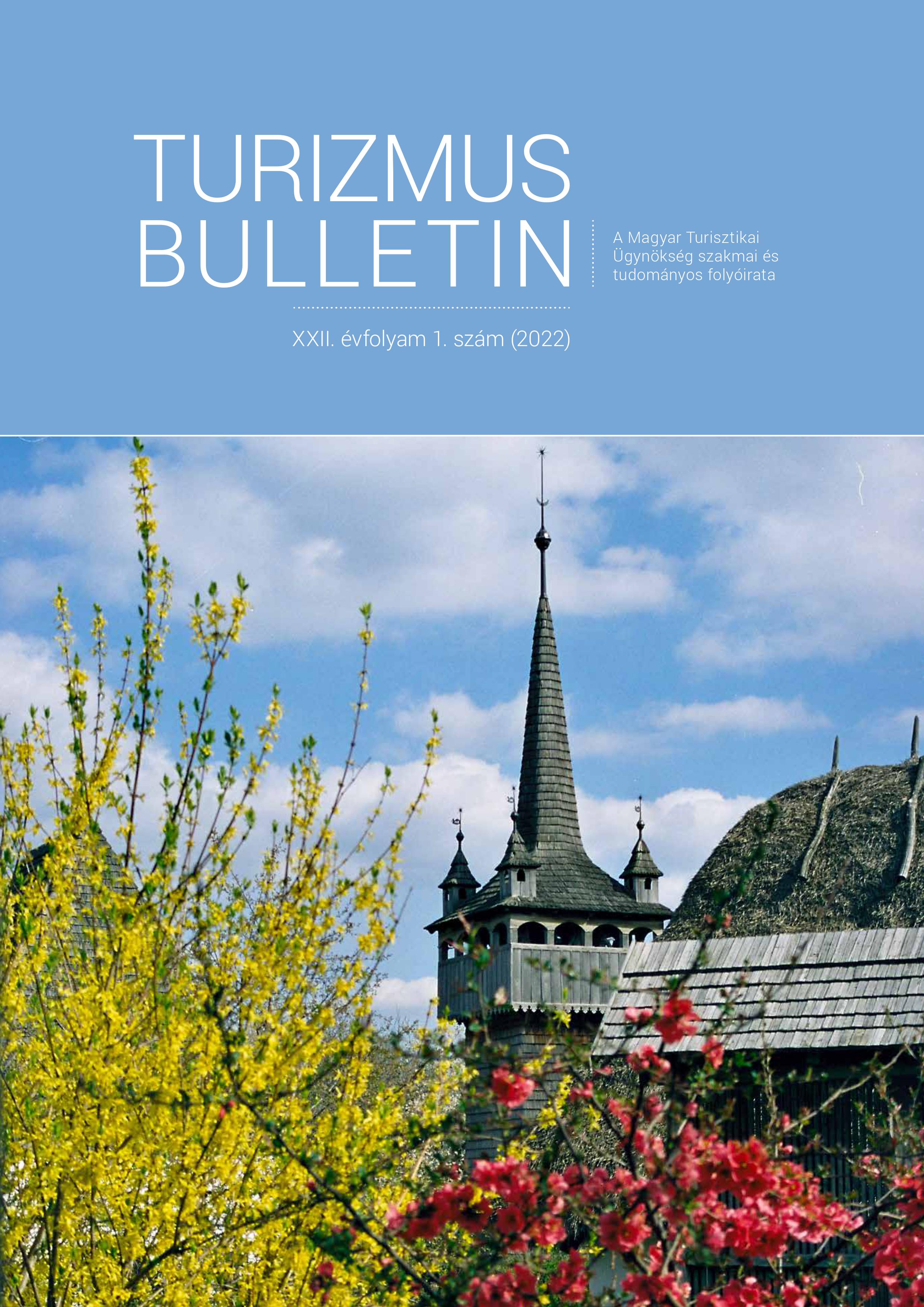Hotel choice habits of the Hungarian generations, in particular the digital natives, alongside sustainability and digitalization
DOI:
https://doi.org/10.14267/TURBULL.2022v22n1.3Keywords:
conscious consumer, tourism, environmental protection, digitalizationAbstract
Green and digital travellers will soon become greatest challenges for the hospitality industry. On the one hand, more and more travellers are aware of environmental and social impacts of their holiday, whilst, on the other hand, digital solutions support and influence our everyday life to an extent never seen before. The introduction of digital solutions can become to a significant opportunity for the hospitality industry, as they can communicate with potential and actual guests via their own devices. New technologies facilitate two-way dialogue between the parties, ensuring personalised communication and the fast flow of information – together with a significant decrease in printing costs. This and similar green solutions are preferred by a growing number of travellers, as a reaction of the intensifying awareness of climate change. The impact of Covid19 also emphasised the importance of sustainability. However, the contradiction between feeling comfortable and being green needs to be resolved by the joint efforts of guests and the hospitality industry. To understand the current situation in Hungary and identify the expectations of travellers, we conducted an online questionnaire among the Hungarian travellers. The expectations and feedback from the guests’ side are evaluated.
References
ÁSVÁNYI K. – KOMÁR Z. (2018): Zöld szálloda-örökzöld imázs: A „zöld” mint minőség és minősítés kommunikációjának elemzése fogyasztói visszajelzések és szállodai honlapok vizsgálata alapján. A hatékony marketing: EMOK 2018 Nemzetközi Tudományos Konferencia konferenciakötete. Selye János Egyetem, Komárom. pp. 265–276.
BABBIE, E. (2000): A társadalomtudományi kutatás gyakorlata. Balassi Kiadó, Budapest.
BENYON, D. – QUIGLEY, A. – O’KEEFE, B. – RIVA, G. (2014): Presence and digital tourism. AI & Society. 29. pp. 521–529. https://doi.org/10.1007/s00146-013-0493-8
BOHDANOWICZ, P. (2006): Responsible resource management in hotels: attitudes, indicators, tools and strategies. Doctorial Thesis, Stockholm.
BUHALIS, D. (2003): eTourism, Information Technology for Strategic Tourism Management. Prentice Hall, Pearson Education Limited, Harlow, England.
DUDÁS K. (2011): A tudatos fogyasztói magatartás dimenziói. Vezetéstudomány. 42(7–8). pp. 47–55. DOI 10.14267/VEZTUD.2011.07.06
GRETZEL, U. – SIGALA, M. – XIANG, Z. – KOO, C. (2015): Smart tourism: foundations and developments. Electron Markets. 25. pp. 179–188. https://doi.org/10.1007/s12525-015-0196-8
GROTTE J. – LUKÁCS R. (2019): Zöld marketing és e-turizmus trendek a szállodaiparban. In: Róka J. – Kiss F. (szerk.): Annales Tomus XII. Universitas Budapestiensis de „Metropolitan”. pp. 159–174.
HOTEL ENERGY SOLUTIONS (2011): Analysis on Energy Use by European Hotels: Online Survey and Desk Research. Hotel Energy Solutions project publications.
HSIAO, T-Y. – CHUANG, C-M. – KUO, N-W. – YU, S. M-F. (2014): Establishing attributes of an environmental management system for green hotel evaluation. International Journal of Hospitality Management. 36. pp.197–208. DOI:10.1016/j.ijhm.2013.09.005
IVANOV, S. (2019): Ultimate transformation: How will automation technologies disrupt the travel, tourism and hospitality industries? Zeitschrift für Tourismuswissenschaft. 11(1). DOI:10.1515/tw-2019-0003
KAPIKI, S. (2010): Energy Management in Hospitality: a Study of the Thessaloniki Hotels. Journal of Economics and Organization of Future Enterprise. Available at SSRN: https://ssrn.com/abstract=2150571
KUCUKUSTA, D. – MAK, A. – CHAN, X. (2013): Corporate social responsibility practices in four and five-star hotels: Perspectives from Hong Kong visitors. International Journal of Hospitality Management. 34. pp. 19–30. https:// doi.org/10.1016/j.ijhm.2013.01.010
KULCSÁR N. (2012): Fogyasztói értékdimenziók vizsgálata a falusi turizmusban. Doktori (PhD) értekezés. Budapesti Corvinus Egyetem, Gazdálkodástani Doktori Iskola. DOI 10.14267/phd.2013052
KULCSÁR N. – GROTTE J. (2018): Mit várunk a szállodáktól? – avagy a legmeghatározóbb fogyasztói szegmens számára értéket jelentő tényezők a szállodákban. Turizmus Bulletin. 18(3). pp. 4–14. https://doi.org/10.14267/TURBULL.2018v18n3.1
PÁL E. – TÖRŐCSIK M. (2013): Irodalmi áttekintés a Z generációról. TÁMOP-4.2.3-12/1/KONV- 2012-0016 „Tudománykommunikáció a Z generációnak” projekt. Pécsi Tudományegyetem.
PRISZINGER K. – GYURÁCZ-NÉMETH P. (2015): Társadalmi felelősségvállalás a hazai wellness szállodák körében – innovatív megoldások a klímaváltozás hatásaira. Területfejlesztés és Innováció. 9(2). pp. 3–11.
SMITH, R. A. (2011): Environmental responsibility in the spa. In: Cohen, M. – Bodeker, G. (eds): Understanding the global spa industry. Routledge. Taylor & Francis. pp. 297–302.
TARI A. (2011): Z generáció: klinikai pszichológiai jelenségek és társadalomlélektani szempontok az információs korban. Budapest: Tericum.
TIMOTHY, D. J. – TEYE, V. B. (2009): Tourism and the lodging sector. Elsevier, Oxford, UK.
TÖRÖK P. (2002): E-turizmus: az internet és e-business szerepének növekedése a turizmusban. Turizmus Bulletin. 6(1.) pp. 16– 22.
TÖRŐCSIK M. (2011): Fogyasztói magatartás. Insight, trendek, vásárlók. Akadémiai Kiadó, Budapest. DOI: 10.1556/9789630597371
YU, B. – SINGH, M. P. (2002): Distributed Reputation Management for Electronic Commerce. Computational Intelligence. 18(4). pp. 535–549. https://doi.org/10.1111/1467-8640.00202
Internetes források
BERNADINE, R. (2018): How we travel in the Digital Age. DayTranslationsblog. https://www. daytranslations.com/blog/digital-tourism-travel/, Letöltve: 2021. március 24.
BERNSCHÜTZ M. (2017): Generációs kihívások & turizmus. Turisztikai Marketing Konferencia 2017. https://www.budapestinfo.hu/clab2/rest/image/document/3460/bernschutz_maria_turisztikai_marketing_konferencia202017csoportkepzesgeneracioelmelet2017.pdf, Letöltve: 2021. március 24.
BREMNER, C. (2020): Travel 2040. EUROMONITOR International. https://marketresearch.enterprise-ireland.com/wp-content/uploads/2019/01/Travel-2040-Sustainability-and-Digital-Transformation-as-Recovery-Drivers-Jul-2020-Euromonitor-.pdf, Letöltve: 2020. március 10.
GSTC (Global Sustainable Tourism Council) (2017): Sustainable Tourism Glossary. https://www. gstcouncil.org/, Letöltve: 2017. augusztus 25.
HARRISON, K. (2014): Green Hotels Are Leading The Pack On TripAdvisor. Forbes. https://www. forbes.com/sites/kateharrison/2014/06/20/green-hotels-are-leading-the-pack-on-tripadvisor, Letöltve: 2020. július 16.
INFOJEGYZET (2017): Fenntartható turizmus. https://www.parlament.hu/documents/10181/1202209/Infojegyzet_2017_41_fenntarthato_turizmus.pdf/47b870e8-9c07-4268-b7e6-db0466b02da3, Letöltve: 2020. augusztus 10.
KEMP, S. (2020a): Digital 2020: Global Digital Overview. https://datareportal.com/reports/digital-2020-global-digital-overview, Letöltve: 2020. szeptember 10.
KEMP, S. (2020b): Digital 2020 July Global Statshot. https://datareportal.com/reports/digital-2020- july-global-statshot, Letöltve: 2020. szeptember 10.
KODZSAIVANOVA, A (2020): 10 тенденции, които ще променят туризма след COVID кризата. https://www.capital.bg/biznes/turizum/2020/12/24/4156283_10_tendencii_koito_shte_promeniat_turizma_sled_covid/, Letöltve: 2021. március 24.
MOHSIN, M. (2020): 10 TikTok Statistics That You Need to Know in 2020. https://www.oberlo.com/blog/tiktok-statistics, Letöltve: 2020. augusztus 10.
MSZÉSZ (Magyar Szállodák és Éttermek Szövetsége) (2019): Zöld szálloda pályázatok. http://www.hah.hu/palyazatok/zold-szalloda, Letöltve: 2019. november 4.
REVFINE (2021): Hotel Trends: Discover The Latest Hotel Industry Trends for 2021! https://www.revfine.com/hotel-trends/, Letöltve: 2021. március 24.
TRAVELIFE (2019): Accommodation sustainability. https://travelifestaybetter.com/, Letöltve: 2020. augusztus 20.
TUIGROUP (2015): Better Holidays Better World. Sustainability strategy 2015-2020. https://www.tuigroup.com/damfiles/default/tuigroup-15/en/sustainability/Reporting/TUI-Group-Better-Holidays-Better-World-strategy_EN-6fe1204e90342f321580a4eb81c7dc72.pdf, Letöltve: 2020. augusztus 20.
TURIZMUSONLINE (2017): Ezeket az élményeket keresik a vendégek a hotelekben és éttermekben. http://turizmusonline.hu/friss/cikk/ezeket_az_elmenyeket_keresik_a_vendegek_a_hotelekben_es_az_ettermekben, Letöltve: 2017. december 8.
UNWTO (2020): Sustainability 2.0: The conversation travel tech cannot ignore in the new normal. https://www.phocuswire.com/sustainability-2-0-the-conversation-travel-tech-can-no-longer-ignore-in-the-new-normal, Letöltve: 2021. március 24.
UNWTO (2021): UNWTO Calls for a More Equal and Sustainable Future for Tourism at ITB Berlin Now. https://webunwto.s3.eu-west-1.amazonaws.com/s3fs-public/2021-03/210312-itb-en.pdf?SSdafkD6gs_I0iLuT5vcZZop9zg1Scjh, Letöltve: 2021. március 24.

